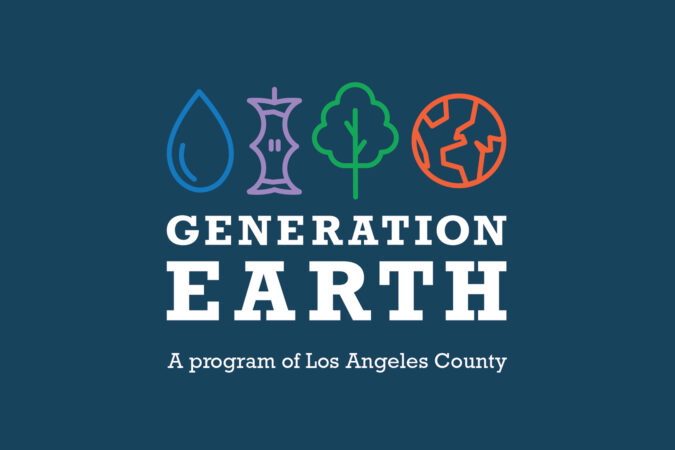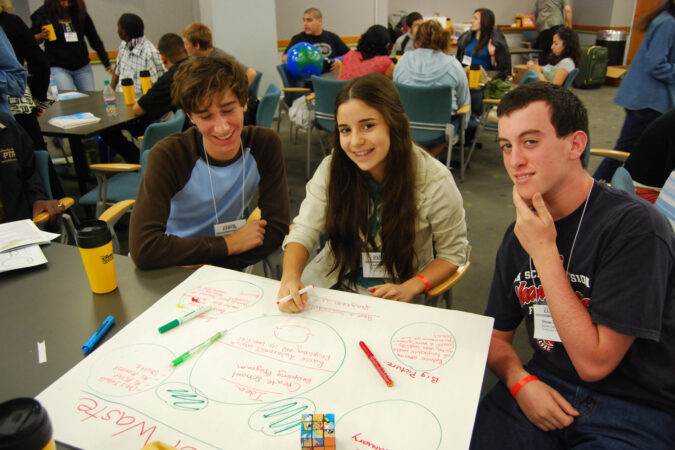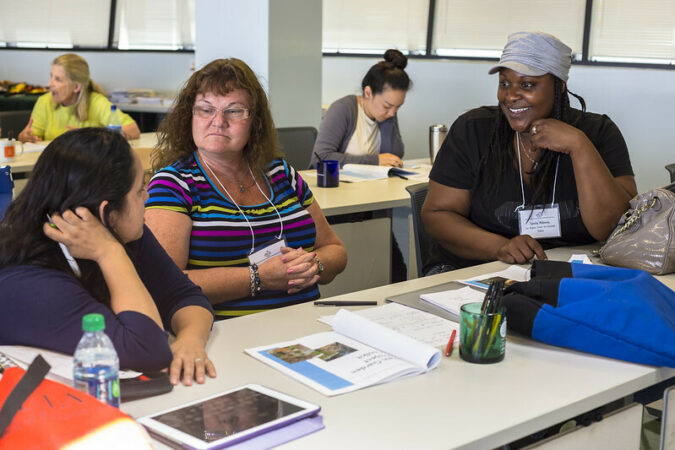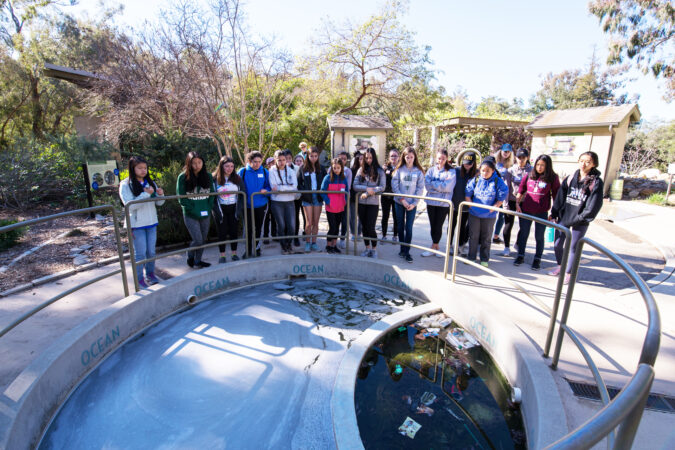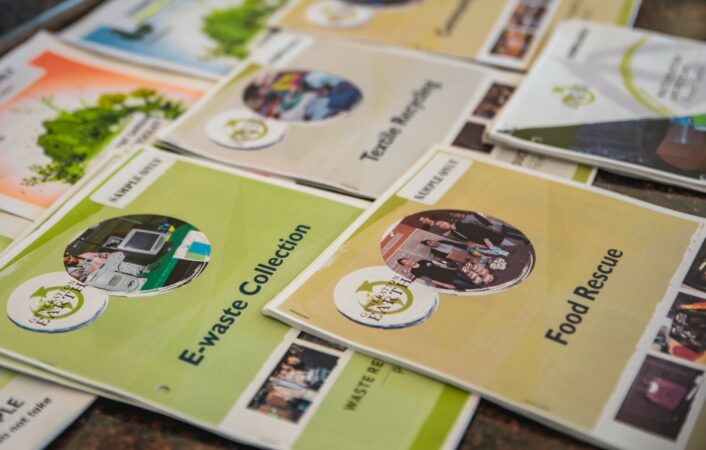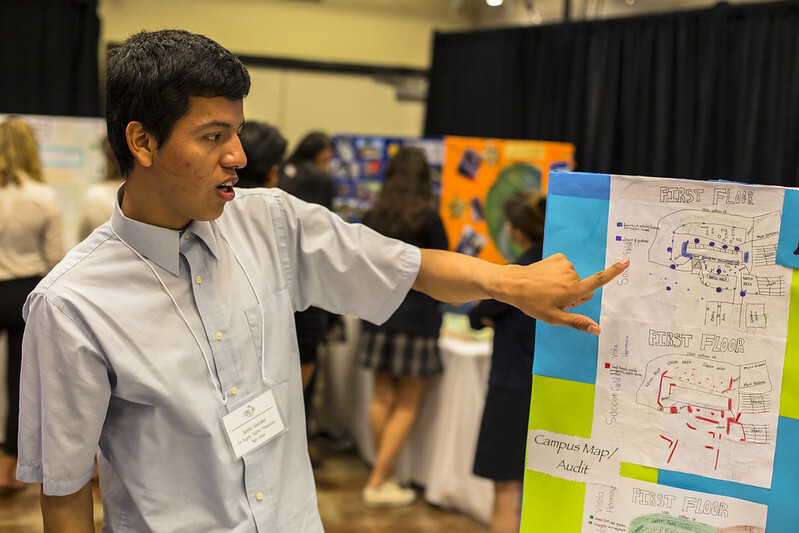

Projects & Presentations
Explore a variety of classroom presentations and environmental action projects.
Last year, Generation Earth guided over 300 environmental action projects in classrooms, schools and communities across Los Angeles County, working with over 10,000 students. This year, we would love to work with you on a fun and meaningful project!
If you are located in Los Angeles County, Generation Earth project coordinators can visit your classroom virtually or in-person and speak on a variety of environmental topics. We can give a presentation, lead an activity or work with you to implement an environmental service learning project in your school or community.
Below, you will find descriptions of the presentations and projects we offer. There are many different options, but if you can’t find the specific topic you are interested in, email generationearth@treepeople.org and we will do our best to accommodate your request. We look forward to working with you!
Guest Speaker Presentations
Let’s Talk Trash!
- Learn about waste management over time and the “end” destinations of our waste as well as the impact that waste has on our environment, health and land.
Compost: The simple Act of Diverting Organic Waste
- 50.8% of waste created in schools comes from organic materials, which contribute to climate change once in the landfill. Students will learn ways in which food waste can be diverted and what California is doing to minimize organic waste.
The Hidden Impacts of Fashion
- Students will learn what textiles are, how textiles are made, the difference between natural and synthetic fibers, the impacts that the production of clothing has on the environment and what we can do to reduce the impact on earth.
Recycling 101: Setting Up a System on Campus
- Gain insight on how to begin a recycling program on campus and encourage students to conduct research, speak to their waste haulers, and involve school administrators in order to implement a recycling system.
Designed for the Dump
- Gain knowledge around e-waste and why it is an important environmental issue and what can be done to remedy it.
Letter Writing 101
- Learn how students can choose a cause, find their voice, research and effectively write a strong advocacy letter to a local community leader or elected representative.
Watershed Health
- Compare and contrast the build, features and effects of natural and urban watersheds while sharing ideas that can be implemented in order to improve watershed health.
Water Pollution & Prevention
- Water pollution is a major issue in LA County. This presentation explains how the urban watershed contributes to water pollution and shares an array of different solutions to this issue.
Urban Heat Island
- Urban heat is the leading weather-related cause of death and directly ties to the amount of trees present in urban communities. This presentation touches on the many benefits of trees, including cooling.
History of the Los Angeles River
- The Los Angeles River is a key element of Los Angeles County. This presentation allows students to view water issues currently faced by the county through the lens of the river.
Environmental Action Projects
Setting up a Recycling System
- Conducting an audit of a school’s waste stream is a great way to understand what is being thrown away and leads to a discussion of ways to divert waste from the landfill.
Setting up a Composting System
- Step by step guidance will allow participants to think about the components needed to set up a compost system. Students will be encouraged to involve their peers throughout the process.
Food Rescue
- Students will receive guidance to ensure edible food is recovered and directed from a landfill to a table. Conducting a food waste audit doesn't have to be daunting-with guidance from a coordinator.
DIY T-shirt to Face Mask/ Tote Bag
- Students can combat waste by creating a tote bag from an old-shirt in this fun, one-hour workshop that can be hosted in-person or virtually.
Advocacy Campaign
- Students can receive support from a coordinator in creating infographic posters to educate their schoolmates on the environmental issue of their choice.
Tree-Care Teams
- Students create teams to care for all established trees on campus or in the nearby community. Coordinators can help demonstrate, coordinate and/or oversee tree maintenance.
Community Cleanup
- Have members of your school or community support you in picking up trash as a means of preventing water pollution and increasing water quality. Generation Earth Coordinators can help you organize this effort.
E-Waste Collection Event
- Promote the proper disposal of electronic waste to keep it out of landfills. E-waste is highly toxic to humans, plants, animals and has been known to contaminate water, air and soil. Students can organize and advertise this event so that community members are able to participate.
Water Audit
- Auditing your home or campus can help identify other potential water projects like installing rain chains or rain barrels. Coordinators can provide guidance to students auditing their home or campus.
Waste Audit
- Auditing your campus can help identify potential waste projects like installing a compost system, recycling system, or conducting an educational campaign. Coordinators can provide guidance to students auditing their campus.
Past Project Highlights
The Benefits of Trees
Students at Sierra Vista Middle were working to measure air pollution and particulate matter in different locations on their school campus. In order to help the students understand the role trees play in purifying their community’s air, Youth Leadership Coordinator, Maria Adame, made an in-person visit to share a presentation specifically tailored to the students’ needs. They were introduced to the many benefits of trees as well as how they contribute to mitigating air and water pollution. During the presentation, the students took notes and asked questions to deepen their understanding and develop their individual environmental service-learning projects. Maria helped the students move forward with their projects by sharing how to advocate for trees and their ample benefits. At the end of the presentation, the students recited a poem for Maria to express their gratitude. It was a wonderful experience for everyone involved!
Waste in the Fashion Industry
Nanci Torres, Waste Management Youth Leadership Coordinator, visited Maywood Center for Enriched Studies to talk with students about textile waste. This project began with a presentation that introduced the students to textiles: highlighting the difference between natural and synthetic materials and revealing the shocking impact textile waste has on the environment. After the presentation, Nanci led the students in an upcycling activity turning old t-shirts into tote bags. The steps involved cutting the shirts along the neckline and sleeves, making cuts along the bottom and making lots of knots. The most amazing part of this activity was that no sewing was required and students only needed to have access to a t-shirt and a pair of scissors. The students really enjoyed showing off their upcycled tote bags and discussing the type of things that they would carry in them. This project led the students to think about other items in their household that they could reuse to make something new.
Recycling Relay Race
Students from Crespi Carmelite High School spent an hour learning about recycling with Nanci Torres, Waste Management Youth Leadership Coordinator. After a brief introduction by the student leadership on campus, Nanci asked for ten volunteers to participate in a recycling relay race. The race consisted of having students form two groups and sort items from a miscellaneous pile placed at the start line into bins placed at the finish line labeled landfill, compost and recycle. Once all of the items were sorted, Nanci reviewed each of the items and answered questions from students.
For the remainder of the hour, the students were asked to form larger groups and discuss the following questions:
- What kinds of environmental impact does trash have on our environment?
- Why is it important to sort our trash into different bins?
- If you were to start a recycling system on campus, what items would be needed?
Once the discussions wrapped up, the students shared their gratitude and how much they learned from the presentation.
Join Our Newsletter
Stay up to date with TreePeople’s newsletter. Find out about upcoming events, announcements, jobs, and other opportunities to get involved!
By submitting, you are agreeing to receive TreePeople related news and occasional communications, and agreeing to our Privacy Policy.

